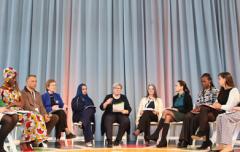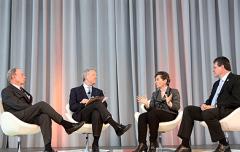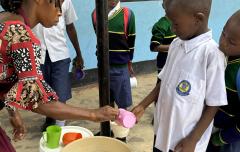SEforALL Forum Day Two Wrap-Up
Lisbon, Portugal – The second day of The Sustainable Energy for All Forum in Lisbon was about speed and scale of solutions. The urgency for bigger, bolder momentum on the SDG7 goals. And backing words with movement and concrete action to leave no one behind.
“You say you’re doing okay with the richest of the poor. What are you doing with the poorest of the poor?” asked Greta Bull, CEO of the Consultative Group to Assist the Poor (CGAP), in a question that captured an important tone for the day.
The Forum’s closing day, with over 800 attendees present, did not disappoint. On a wide range of issues – energy access finance, bringing clean energy to refugee camps, clean cooking – government leaders, companies, NGOs and financiers stepped up with new collaborations and commitments to achieve faster results.
And, with the Forum spurring a whole host of follow-up working meetings taking place on Friday in locations across Lisbon, more progress can be expected.
“We’ve got a theme here. Just do it,” said Rachel Kyte, Chief Executive Officer and Special Representative of the UN Secretary-General for Sustainable Energy for All, in her closing remarks.
“I got the passion. I’m going back to Ghana with that passion,” added the Hon. Hajia Alima Mahama, Ghana’s Minister Local Government and Rural Development.
At the close of the Forum, Kyte and Mahama were joined on the stage by dozens of leaders from government, business, academia, civil society and other groups who over the two days had made new action pledges.
Among the day’s highlights:
Sustainable Energy in Humanitarian Settings: With displaced populations increasing worldwide, the urgency for providing clean energy and clean cooking solutions at refugee camps and other humanitarian settings is growing. “They come, and they are welcome, but we need to provide for them,” said the Hon. Simon D’Ujanga, Uganda’s Minister of the State of Energy, which has 1.5 million refugees, most of whom rely on local firewood for cooking.” In a packed session, government leaders, UN officials, foundations and civil society pledged to work together to accelerate gains to bring clean affordable energy to humanitarian settings. Everyone agreed that replicating success stories, such as solar plants that are now powering two refugee camps in Jordan, is an imperative. “We’re still not being serious on this. What difference will you make between now and the end of the year and how can we hold ourselves accountable?” said Andrew Harper, director of the Division of Programme Support and Management at UNHCR, the UN refugee agency.
Spurring Energy Access Finance in Africa: More financing and different kinds of financing are critical for supporting and scaling projects and enterprises that are providing energy access in regions with the biggest gaps, particularly Sub-Saharan Africa. The European Union agree to boost spending on off-grid energy and last-mile electrification and off-grid. Provider Mobisol highlighted the significance of $30 million of local currency asset-backed financing.
Government Leadership: Yesterday left no doubt that governments, many of them in Africa, are stepping up on leadership in advancing strategies and policies that will accelerate SDG7 gains. “We now have a truly global leadership cohort of countries that have really ambitious plans and have set aggressive targets. We now have that with countries such as Bangladesh, Kenya and Rwanda,” Kyte said. Among the examples that emerged yesterday: Rwanda committed to reduce – from 83 percent to 42 percent – the percentage of its population cooking with traditional biomass fuels by 2024. Uganda and the Smart Communities Coalition agreed to work together to bring clean cooking and other sustainable energy solutions to the country’s growing refugee population. Somalia is hosting a multi-stakeholder meeting Friday in Lisbon to advance its efforts to run its economy on clean energy. Togo committed to 60 percent of new power connections by 2030, largely provided by the private sector.
Announcements: During the Forum, the Shine campaign was officially launched with three-dozen groups from the faith and philanthropic sectors making commitments to mobilize financing for energy access efforts. Among others, those commitments included the Wallace Global Fund targeting one percent of its total investment portfolio to energy access efforts in Sub-Sahara Africa and the IKEA Foundation rolling out six new grants totaling over $40 million to support energy access work in Asia and Africa. SEforALL also signed a new Deliver Partnership with leading energy effieicny business, Danfoss. The partnership will focus on our Cooling for All initiative, the District Energy Systems Accelerator and work to continue action on energy efficiency that supports SDG7 goals. A new Middle East Hub was also announced by SEforALL and the Islamic Development Bank which will be hosted at ISDB Headquarters in Jeddah, Saudi Arabia. The Hub will raise awareness at the national and regional level of the challenges, constrains and opportunities available while achieving the three core objectives of SDG7. Finally, Total and SEforALL also signed a Delivery Partnership, that will support work on the Electrification Accelerator network and expanding global access to clean cooking fuels and technologies. SEforALL will also work with the company to engage the power industry to achieve stronger integration of both grid and off-grid electrification projects.




